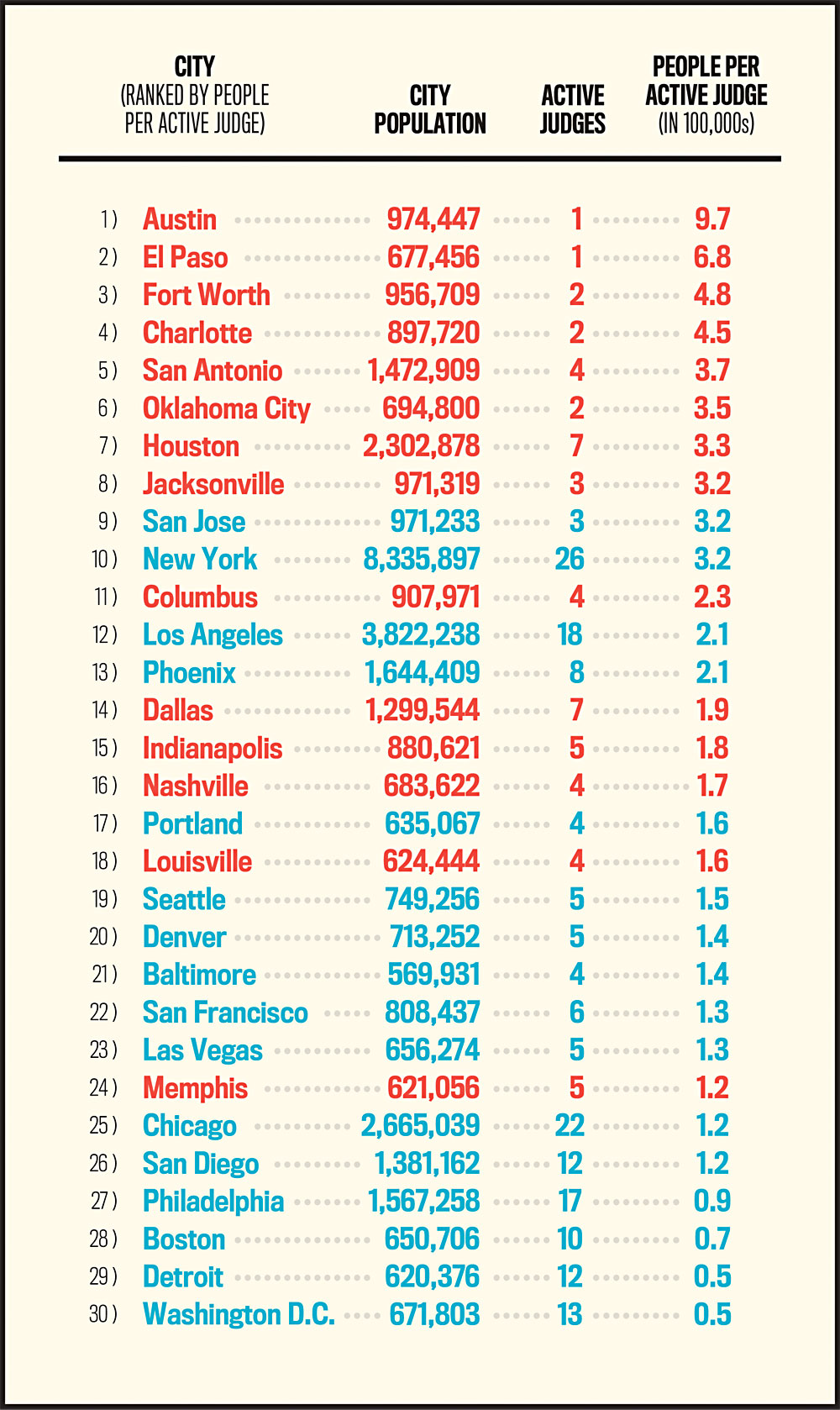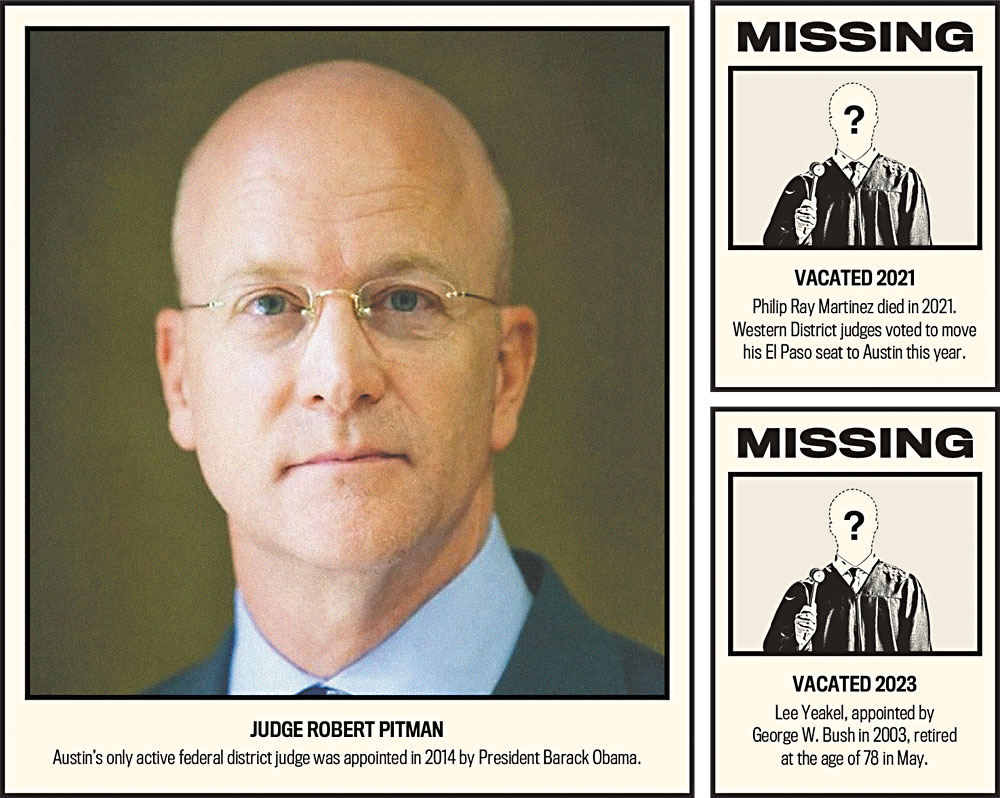Austin’s Sole Federal District Judge May Be the Most Overburdened in America
The case of the missing judges
By Maggie Q. Thompson, Fri., Sept. 29, 2023
Federal district judges become suddenly very important when decisions with nationwide implications are in their hands. Say, when they decide to suspend the Food & Drug Administration approval of abortion pills, as an Amarillo district judge did this April. Or when they decide that those who help a pregnant person leave the state for an abortion cannot be prosecuted for rendering that assistance, as Austin District Judge Robert Pitman ruled two months earlier.
But those headline-worthy cases represent a tiny sliver of a district judge's work. For Pitman, the abortion travel case was one of more than 1,000 he'll be expected to hear in 2023. If that sounds absurd, that's because it is. Following Judge Lee Yeakel's retirement on May 1 this year, Pitman may be the most overburdened federal judge in U.S. history.
Though those in the legal community say a city of Austin's million-person size needs six to nine district judges, we only have three seats, and two of those are empty. It would take an act of Congress to create a new federal bench in the Western District of Texas – which stretches across a quarter of the state – and that hasn't happened since 1990.
One would expect that, at the very least, filling our paltry number of existing seats would be a top priority for the Biden administration. Because we're in the capital of the largest red state in America, our federal dockets hold an unusually high number of cases with constitutional dimensions. Should the next administration be Donald Trump's, confirming Texas judges now would ensure fewer lifetime appointments selected with far-right interests in mind. It would also unencumber Texas judges, including the Obama-appointed Pitman. Pitman is, after all, the rare human being whose intellectual capacity actually plays a part in upholding our basic rights.
Austin isn't alone in facing a significant shortage of federal judges, although ours is more severe than in any other of the largest 30 cities in the United States. In general, Congress has not created enough benches to serve America's booming cities and regions. In particular, Presidents Joe Biden and Barack Obama did not prioritize judicial appointments in red states. It's been "neglect and indifference," says U.S. Rep. Lloyd Doggett, a former Texas Supreme Court justice himself.
"That's one of the main reasons that so many outrageous decisions originate from Texas," Doggett told the Chronicle. "President Obama never placed a priority on that. He left vacancies in Texas, and we continue to pay the price today because of all the bad appointments [from the Trump administration]."
Although our state accounts for over 11% of all of the country's federal judicial vacancies, Biden has only nominated one district judge for Texas in his three years in office – that was last month. Of Austin's seats, one has been empty for more than 2½ years. The other, Yeakel vacated this spring at the age of 78 to join local law firm King & Spalding. "There are a lot of little reasons I retired," he said. "The big reason is that I wanted to leave when I could still do the job. I knew some judges who stayed on too long. I didn't want to get into that phase, because you're always remembered for the end. One of the little reasons was that our dockets are so big in Austin, I got tired of knowing I could work as hard as I could in a month and I was going to have more cases on the docket at the end of the month than I did at the beginning."
Due to partisan deadlock over judicial appointments in Washington, D.C., Yeakel said, "I don't think we'll get confirmed judges for Austin benches until late 2025, at the earliest. I can't see anything happening before the 2024 election."
"It's a perfect storm," Pitman told the Chronicle, "produced by the explosive growth of Austin and the Austin docket, the lag in the creation of judgeships to keep pace with that growth, and the retirement of my dear colleague. And when we wake up, we find that the 10th-largest city in the country has one active federal judge."


Who’s in Charge Here?
When it comes to federal judges, Texas has been particularly neglected, and our numbers show it. The Chronicle compared the populations and number of active district judges in the 30 largest cities in the U.S. Of the 10 cities with the most people per judge, five are here in Texas. (Austin is No. 1, with roughly 1 million people to one judge. Next is El Paso, with 700,000 to a judge, followed by Ft. Worth at half a million.) Meanwhile, shrinking cities such as Detroit and Philadelphia have more than a dozen active judges each.
"There are some parts of the country where Judge Pitman's job is a two-day-a-week job. I don't think there's any district judge anywhere in Texas that has an easy docket," Yeakel said. "The public should be aware that their business is not being taken care of in their court system efficiently. They should demand from their senators the appropriate number of judgeships."
Filling existing seats is ultimately up to the president who nominates federal judges, but senators play especially important roles in the selection process. For judicial nominations, the Senate has a blue-slip policy – senators of the home state of any potential judge must return a slip saying that they won't reject the nominee. The idea is to incentivize consultation between the White House and home-state senators. To make the process of compromising efficient, many senators use bipartisan committees to screen and recommend judicial nominees. Senators John Cornyn and Ted Cruz are in that camp.
"I have the hardest-working group of lawyers on my committee, and they work for free," says David Prichard, who's been chair of Texas' Federal Judicial Evaluation Committee since 2013, having served on it since 2003. "Let me say this, when we put our nose to the grindstone and start the application process, I think this is one area where I still see bipartisanship. Let's face it, you haven't seen Sen. Cornyn or Sen. Cruz refuse to return a blue slip in a long time, have you?"
Generally, it's up to the senators to decide which vacancies to fill first. They then recommend candidates to the president, who picks a final nominee. "It could work backwards. The White House can say, 'We're interested in these people,'" but it's rare, Prichard said.
Most recently, Cornyn and Cruz decided to fill El Paso and McAllen seats, due to "emphasis on the border," Prichard said. The process for El Paso and McAllen was standard: First, senators opened up applications on their own websites, and their staff narrowed down the first round of candidates. From there, applicants' names went to the evaluation committee. Each member ranked each applicant, and Prichard sent compiled rankings to the senators' chief counsels. From there, senators narrowed it down to between two and four top applicants. The full committee interviewed each applicant for 30 minutes and members noted their new rankings. Prichard handed the new rankings to the senators, and now the ball is in their court. Next, recommendations will go to Biden, who will choose a nominee.
So where does partisanship come into play? Prichard sees it as a bipartisan and levelheaded process, though he concedes, "Different administrations prioritize judicial appointments differently. I think Congressman Doggett has a point. … I've heard some disappointment from Democrats, especially for President Obama, that based upon his background as a constitutional law professor for a while, and the fact that he is a lawyer, that that didn't seem to be as high a priority as it could have been."
As for partisanship in the evaluation process itself, we asked whether questions posed during interviews with judges have changed during Prichard's 20 years on the committee.
"Some remain the same, some have changed. One question has become fairly common in the last two to three years, and that is, 'Tell us how you feel about and how you would deal with nationwide injunctions,'" which are orders that put a stop to actions that threaten others' rights. "That's become a hot-button issue. It shuts down an administration's policy, so [members ask], 'Do you think that's a ho-hum deal, do you think that should be a limited thing?'"
Why the Stalemate?
The vast majority of cases district judges consider are far from partisan. They're hearing slip-and-fall cases, business disputes, and criminal sentencings, among other things. "I don't know how many zeros you'd have to put after the decimal to get to the percentage of hot-button issues on my docket," Yeakel said.
Austin's docket is particularly diverse, and stuffed with complex, time-intensive cases. Last year, Pitman and Yeakel together handled 1,146 civil cases and about 200 criminal cases. "Austin is one of the most diverse dockets that you will find," Pitman told us. "There are certain kinds of cases that are overrepresented on the civil side and those would be cases with a constitutional dimension, civil rights cases, and intellectual property cases," which are especially complex in the tech world.
Yeakel explained that, given that diverse caseload, overstuffing dockets hampers justice in two main ways. First, it creates long waits for trials over more day-to-day issues, which can force folks into settlements. Second, in those cases of national importance, it robs judges of the time they need to draft the most sound and complete opinions possible. "You as the writing judge have to be convinced that you have correctly applied the law and the facts and are willing to stand by it if questioned," Yeakel said. "I may think what I wrote was airtight, and the Supreme Court might disagree. I want to write an opinion so when another court is reviewing it, if that court disagrees, they're forced to right where I was wrong and explain that the trial judge got it wrong because here is the law."
Pitman does have help: Magistrate judges, selected by district judges themselves, can preside over limited types of cases. In some instances, they can provide Pitman with a recommended ruling, which he must then sign off on. Visiting judges, too, lend a hand and Austin benefits from being a desirable city to visit. A federal judge in Hawaii who took senior status (i.e., went into semi-retirement) has been handling a substantial number of cases in Austin. That doesn't solve the problem, though.
Prichard has a legislative idea to address shortages. "We've got something like 400 courts. Let's deploy them," he says. "Times have changed. Back in the Forties, Fifties, and Sixties, Detroit probably needed 18 federal judges. They don't need those now. What I've told Senator Cornyn and Judge Yeakel is, people are always saying we need to create more judges. Really, we've got enough federal judges, we just don't have them in the right places." What he proposes is something similar to BRAC (Base Realignment and Closure), the congressionally authorized process the Department of Defense used to reorganize its military base structure. "It was highly controversial because it closed a number of bases. We lost a base or two in San Antonio, but that's the way the cookie crumbles," Prichard says.
His idea is not to force judges to pack up and move, but to shift vacant seats around. "I think it's a pipe dream but it makes all the sense in the world," he said. "You'd have to get senators in the states that would lose judges to agree with the senators who'd gain them. And you'd have some strange bedfellows, senators in Texas and California aligned, and senators in Michigan and Alabama aligned."
Cornyn's office did not respond to our request for comment. To Doggett, the idea misses the point. "The basic problem in Texas and throughout other Republican-dominated red states is that neither President Obama nor Biden gave us the same priority in improving justice as they did in blue states," Doggett said. "While for many years the Judicial Conference has recommended additional federal courts be created in Texas, I do not support creating any new courts until the Biden administration demonstrates a much stronger commitment to filling existing vacancies in Texas. Naming more judges screened and blessed by the Federalist Society will not strengthen our justice system."
Yeakel does see an urgent need for more seats, but says filling them would require a culture shift in D.C. He doesn't believe judges themselves have become more partisan. Instead, he says confirmation hearings that are "all about ideology have led to the politicalization of the courts in the eyes of the public. It's the Senate that's being more political, not the judges."
"The irony is most of the cases that these district judges are deciding are not partisan issues," said Stacy Rogers Sharp, a UT-Austin law professor and expert on federal courts. (She once clerked for Yeakel.) "They are deciding contract disputes, and a boatload of sentencing, ordinary slip-and-fall cases, Social Security appeals, bankruptcy – things that have nothing to do with a Democratic or Republican platform. There's going to be the rare case that is about an abortion issue. This is a true case of partisanship getting in the way of justice being served. We all need these judges to be at the bench making these decisions about things that have nothing to do with partisan politics."
Got something to say on the subject? Send a letter to the editor.










